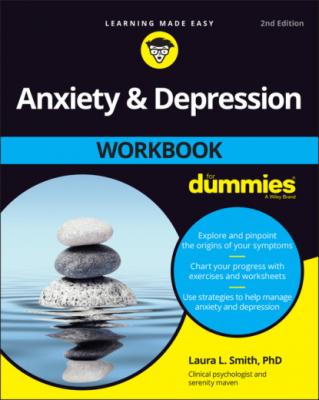Anxiety and Depression Workbook For Dummies. Laura L. Smith
Читать онлайн.| Название | Anxiety and Depression Workbook For Dummies |
|---|---|
| Автор произведения | Laura L. Smith |
| Жанр | Журналы |
| Серия | |
| Издательство | Журналы |
| Год выпуска | 0 |
| isbn | 9781119867449 |
When and Where to Get More Help
Self-help tools benefit almost everyone who puts in the effort. Many people find they can overcome minor to moderate emotional problems by working with books like this one. Nevertheless, some difficulties require professional help, perhaps because your anxiety or depression is especially serious or because your problems are simply too complex to be addressed by self-help methods.
Worksheet 1-15 The Serious Symptom Checklist
| I have thoughts about killing myself.I feel hopeless.My sleep has been seriously disturbed for more than two weeks (including sleeping too little or too much).I have unbearable pain.I’m a horrible burden to my family.My partner left me for another, and I can’t take the humiliation anymore.I feel out-of-control anger toward someone and want to seek violent revenge.My life is worthless, and I have no reason to live.I’ve gained or lost more than a few pounds without trying to do so.I’m ignoring major responsibilities in my life, such as going to work or paying bills.I’m hearing voices.I’m seeing things that aren’t there.My drug use or drinking are interfering with my life.My thoughts race, and I can’t slow them down.Someone I trust and care about has said I need help.I’ve been getting into numerous fights or arguments.I’ve been making really poor decisions lately (such as making outlandish purchases or getting involved in questionable business schemes).Lately I’ve felt that people are out to get me.I haven’t been able to get myself to leave the house except for absolute essentials.I’m taking risks that I never did before.Suddenly I feel like I’m a special person who’s capable of extraordinary things.I’m spending considerably more time every day than I should repeating actions such as hand washing, arranging things, and checking and rechecking things (appliances, locks, and so on).I have highly disturbing flashbacks or nightmares about past trauma that I can’t seem to forget about. |
If you checked one or more of the statements above and you’re not suicidal but are beginning to think that perhaps you need help, where should you go? Many people start with their primary care provider, which is a pretty good idea because your provider can also determine if your problems have a physical cause. If physical problems have been ruled out or treated and you still need help, you can:
Ask your primary care provider for a recommendation.
Check with your state’s psychology, counseling, social work, or psychiatric association.
Call your insurance company for recommendations.
Ask trusted friends or family for recommendations.
Contact your local university department of psychology, social work, counseling, or psychiatry for a referral.
At this point, you should pat yourself on the back. Whether this is the first chapter you’ve read or not, you’ve made a good start. Every minute you spend with this workbook is likely to improve your mood. Just give it a little time.
Chapter 2
Discovering the Beginnings
IN THIS CHAPTER
If you’re reading this book, you probably feel a little anxious or depressed, but you may not know where those feelings come from. It’s valuable to understand the origins of your feelings, whether it’s biology, genetics, personal history, or stress. This chapter helps you gain insight into the source of your problem and connect the dots. Knowing the origins of your emotions allows you to discard the baggage of guilt and self-blame, and what’s not to like about that?
This chapter reviews the major causes of depression and anxiety: biological, genetic, personal history, and stress. Many therapy clients believe that they’re to blame for having succumbed to emotional distress. They think that personal weakness is responsible for troubling emotions. However, when they discover the factors that have contributed to the origins of their problems, they usually feel less guilty. Getting rid of that guilt frees up energy that can be used for making important changes.
Biological and Genetic Influences
The debate over nature versus nurture is complicated. Are you who you are primarily because of the genetic code you’ve inherited? Or did you emerge from the many interactions with people and places over the course of your life? Of course, the answer is both. Genes interact with experiences to produce the person you are today.
Nevertheless, genetic makeup does influence certain tendencies.
